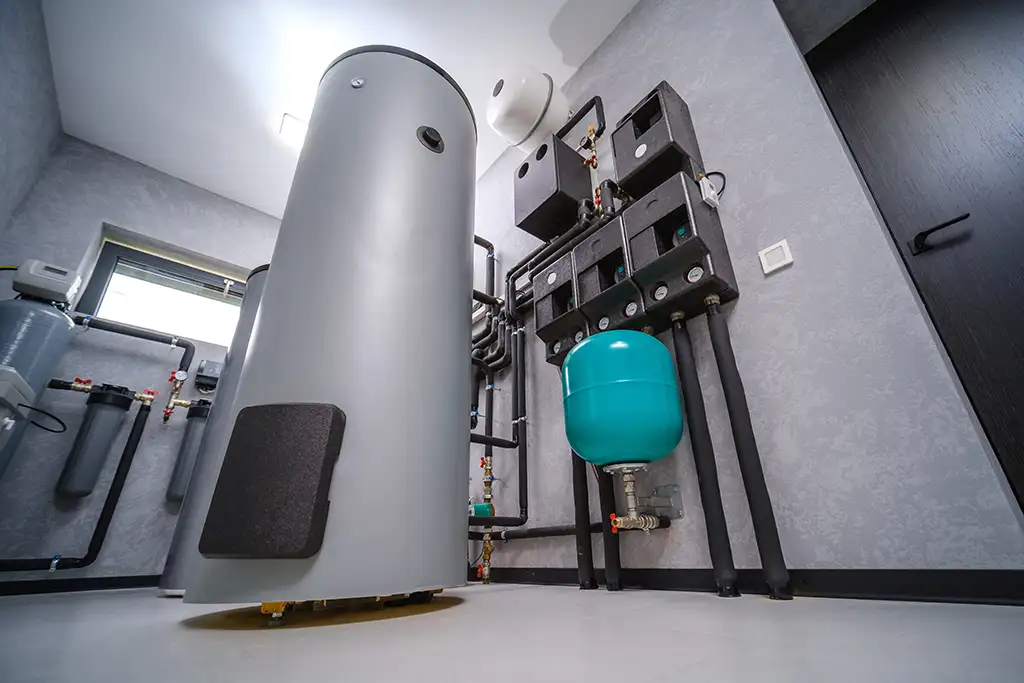
Understanding home boiler essentials is crucial for homeowners, especially as winter approaches. Knowing the basics of your boiler system, from how it works to regular maintenance, can significantly impact your home’s heating efficiency and energy costs. This guide covers everything you need to know about residential boiler essentials.
How Boilers Work
Boilers heat water or create steam, distributing warmth through radiators, underfloor heating, or domestic hot water systems. Heated water circulates through pipes to these terminals, releasing heat into your rooms. The cooled water returns to the boiler to be reheated, creating a continuous cycle.
Types of Boilers
Next on the list of home boiler essentials are types of boilers. Choosing the right boiler type is fundamental for your home’s heating system. The decision impacts comfort, energy consumption, and finances. The three main boiler types are combi, system, and regular.
Combi Boilers
Combi boilers, short for combination boilers, heat water and provide domestic hot water on demand. Ideal for smaller homes where space is limited, they eliminate the need for a separate hot water cylinder. While compact, they may struggle to meet multiple, simultaneous hot water demands.
System Boilers
System boilers heat and store domestic hot water in a cylinder. With most components built-in, installation is simpler. They offer higher hot water output for larger households, though they require space for a hot water storage cylinder.
Regular Boilers
Regular boilers, also known as conventional or heat-only boilers, store hot water in a separate cylinder and often require a cold water tank and an expansion tank. Suited for larger, older homes with potentially low water pressure, they may be less efficient than modern options. They can effectively supply multiple bathrooms due to the dedicated hot water storage and dual tanks.
Fuel Sources for Boilers
Boilers use various fuel sources, including common fuel like natural gas, offering homeowners several options.
Natural Gas
Natural gas is a prevalent and relatively clean boiler fuel, especially convenient for homes with existing gas lines. It offers efficient heating without distributing dust and allergens like forced-air systems.
Oil
Oil boilers are a viable choice for homes without access to gas lines. They require an on-site oil tank, ranging from 200 to 1,000 gallons depending on household needs.
Electricity
Electric boilers offer a clean and simple option but can be expensive to operate depending on local electricity costs. They are most cost-effective in areas with low electricity rates or when paired with renewable energy sources.
Propane
Propane boilers are often used in rural locations without access to natural gas lines or affordable electricity. Like natural gas, propane boilers require minimal maintenance. However, propane fuel must be delivered and stored on-site.
Boiler Efficiency and AFUE
Boiler efficiency is indicated by the Annual Fuel Utilization Efficiency (AFUE) rating. Higher AFUE ratings equate to lower operating costs due to better fuel utilization. For instance, a 95% AFUE boiler converts 95% of the fuel into heat, minimizing waste. High-efficiency condensing boilers are among the most efficient options.
Boiler Venting
Proper boiler venting is essential for safely removing exhaust gases. There are several venting methods.
Chimney Venting
Traditional chimney venting utilizes a chimney to expel combustion gases. Safety and control are critical considerations as described in industry standards like the ASME BPVC and ASME-CSD-1, particularly for automatically fired boilers.
Power Venting
Power venting uses a fan to actively expel exhaust, enhancing efficiency and installation flexibility with smaller vent pipes compared to large chimney stacks. This offers more versatility in venting options.
Direct Venting
Direct venting, or sealed combustion, draws combustion air from outside and directly expels exhaust gases through a dedicated vent pipe. This method is highly efficient and eliminates the need for a traditional chimney, making it ideal for modern homes.
Boiler Sizing
Correct boiler sizing is crucial for optimal performance. An undersized boiler won’t adequately heat your home. An oversized boiler will frequently cycle on and off, wasting energy and reducing its lifespan.
Professional assessment is crucial for calculating the proper heat output based on factors such as climate, home size, and insulation.
Boiler Maintenance
Annual professional maintenance is essential for optimal boiler efficiency, safety, and longevity. A technician can identify potential problems like gas leaks, clean components, and ensure proper operation. This preventative maintenance helps maximize fuel utilization efficiency and extends the boiler’s lifespan.
Boiler Costs and Financing
Boiler costs vary depending on several factors, including boiler type, fuel source, AFUE rating, installation complexity, and additional components like indirect water heaters. Researching and comparing prices is vital.
Financing options are often available, enabling homeowners to manage upfront costs. Explore local rebates, tax incentives, and utility company programs that can help offset expenses. For those considering credit for upgrades, some contractors provide programs offering discounts for consistent filter purchases, aiding in long-term cost management.
Additional Home Boiler Essentials
Beyond the boiler unit itself, several other components are essential for a functioning heating system, such as circulator pumps, valves, and expansion tanks. These components play crucial roles in maintaining safe and efficient operations.
Pumps and Valves
Circulator pumps move hot water throughout the heating system, while valves regulate flow and distribution to radiators or underfloor heating. These elements work in concert to maintain consistent temperatures based on the system’s design.
Expansion Tanks
As the water heats, it expands in volume. The expansion tank accommodates this expansion, preventing pressure buildup that could damage pipes or other components. This is a vital safety feature for any hot water boiler system.
Consulting a qualified professional is crucial for safe boiler installations. Professionals should be familiar with local codes, like the International Mechanical Code (IMC) and International Building Code (IBC), ensuring your boiler setup meets safety standards. They also must adhere to fuel gas and plumbing codes (IFGC and IPC) which is especially relevant during retrofitting, particularly for proper chimney clearance. Understanding these parameters can save you money on energy costs while keeping your house warm and safe.
Conclusion on Home Boiler Essentials
Understanding home boiler essentials is a worthwhile investment for any homeowner. It empowers you to make informed decisions about your heating system, contributing to a warm, comfortable, and energy-efficient home. This guide simplifies these concepts, making boiler selection, maintenance, and related systems less daunting and more manageable.
Understanding these essentials enables proactive planning and minimizes unexpected issues. Investing in a reliable and efficient boiler promotes peace of mind, ensures consistent heating, and can significantly reduce long-term energy costs.
Contact us today for more information or to schedule a free consultation.



